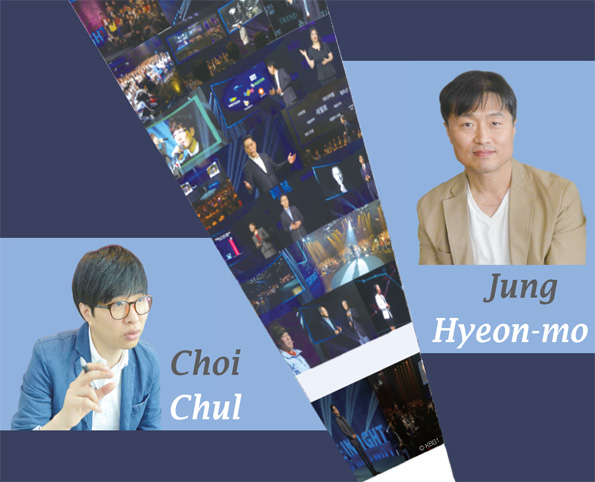Do you know about the TV program named ‘The Insight’ that is broadcast on channel KBS 1TV every Friday night? This program takes the combined form of a lecture and a documentary, which is called a ‘Lecturementary’, and is a place for discussions about issues between lecturers and audiences. ‘The Insight’ has a special feature, ‘future participants’, which are the supporters of the program. Through the 10,000 future participants, ‘The Insight’ has grown and Producers Jung Hyeon-mo and Choi Chul are the ones who adopted this policy for the first time. -Ed
First, please give us your self-introduction.
Choi : Hello. My name is Choi Chul, and I am the Outdoor Producer of ‘The Insight’. I take a role in casting and supervising future participants, which is a core position.
Jung : Nice to meet you. My name is Jung Hyeon-mo. I have been a producer for 20 years, and I belong to the KBS documentary department. I have done other famous works, but ‘The Insight’ is my first work that I produced myself and it took a year and half to be broadcast.
Can you explain ‘The Insight’ briefly?
Choi : Myeong-Gyeonmanri means ‘being able to prospect the future’, and it also means to be good at observation, judgement and perception. Using this concept in ‘The Insight’, a lecturer introduces a subject to audiences and draws the publics’ opinion.
What is your goal after ‘The Insight’?
Choi : I have lots of plans about programs. I always pay attention to relationships between people. One of the programs that I am thinking of is called ‘Give me one more dish’. This program talks about foods of retrospect. I planned this program in 2008.
Why did you decide to create this program?
Jung: Have you ever seen a documentary on KBS? Not a documentary that is full of attractions, but a documentary that has powerful messages. The ultimate goal of a documentary is to spotlight issues and make those things hot issues among the public. Even 20 years ago, the power of media was so strong. Once a program broadcasted, viewers actually discussed it for about a week. However, things have changed now. No matter how much people say that national broadcasting is still powerful, it is true that it almost lost that power. Viewers these days are rejecting to take problems passively. They want to interact and communicate with programs. This means that showcasing a specific topic by using the old format of documentary is not good for ratings or effects. Because of this problem, we made a program that can communicate with its viewers.
In the program, most lecturers are outstanding elites in their fields. How are they cast?
Jung: Every week, producers of the program have a topic that they want to share with people. We consider what kind of lecturer would be the best for our program, select the person who is suitable and start the casting procedure. Also, the lecturers of the program do not repeat the producers’ scripts. They prepare the program by reporting the topic, look into it, and develop the topic into their story. Of course, when we are planning the program, we cannot help but lay our eyes on celebrities. Still, we are trying to consider how much passion a participant has.
We heard the ‘future participants’ are the driving force of ‘Good insight’. Can you tell me what the driving force in broadcasting them is?
Choi : We took ‘future participants’ in the 2nd episode. At that time, the future participants were about 20 people. That was only a handful of people. Now, The Insight is thankful to them. Without them, the lecturers would have looked like they were talking to the wall.
Jung : I think the real form of conversation is asking questions, answering back and talking about opinions. That is not only how lecturers deliver their knowledge to an audience but also how they communicate with them. For this kind of communication, the future participants’ role is very important.
By Lee Eun-hye
eh37@cbnu.ac.kr
By Kim Soo-min
sm36@cbnu.ac.kr


 All
All People
People






 Lee Eun-hye & Kim Soo-min
Lee Eun-hye & Kim Soo-min













